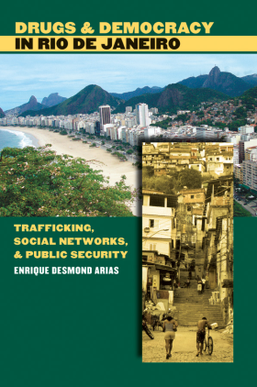Drugs and Democracy in Rio de Janeiro
Drugs and Democracy in Rio de Janeiro is a complex and multifaceted issue that encompasses the interplay between narcotics trafficking, law enforcement, and political governance in Rio de Janeiro, a major city in Brazil. This topic delves into the challenges and strategies related to combating drug trafficking, the impact of drugs on the local communities, and the efforts to implement democratic practices in areas often controlled by drug cartels.
Overview[edit | edit source]
Rio de Janeiro, known for its stunning landscapes and vibrant culture, also faces significant challenges related to drug trafficking and violence. The city's favelas (slums) are often the epicenters of drug-related activities, where drug cartels exert considerable influence. These groups not only engage in narcotics trafficking but also in various forms of organized crime, including extortion, kidnapping, and homicide. The presence and actions of these cartels significantly impact the social fabric and governance of Rio de Janeiro, posing challenges to the implementation of democratic practices and the rule of law.
Drug Trafficking and Violence[edit | edit source]
Drug trafficking in Rio de Janeiro is a major issue, with several drug cartels operating within the city. These organizations control large portions of the favelas, where they recruit locals, often youths, to work in their operations. The competition among different cartels for control of drug trafficking routes and territories leads to frequent and violent clashes, not only between rival cartels but also with the city's police forces. The violence associated with drug trafficking has profound effects on the local communities, including loss of life, trauma, and displacement of residents.
Law Enforcement and Public Security[edit | edit source]
The response to drug trafficking and violence in Rio de Janeiro has involved significant law enforcement efforts, including police operations and military interventions. The Brazilian government has, at times, deployed the military to regain control of areas dominated by drug cartels. However, these operations have been criticized for their heavy-handed approach, often resulting in civilian casualties and further eroding trust between the communities and the state. Efforts to reform the police and implement community policing strategies have been proposed as alternatives to improve public security and rebuild trust.
Democracy and Community Engagement[edit | edit source]
Amidst the challenges posed by drug trafficking and violence, there have been efforts to strengthen democracy and promote community engagement in Rio de Janeiro. Non-governmental organizations (NGOs) and community leaders have worked to provide social programs, education, and economic opportunities as alternatives to involvement in drug trafficking. These initiatives aim to empower local communities, promote democratic values, and reduce the appeal of drug cartels. Furthermore, public debates and participatory planning processes have been introduced in some areas to involve residents in decision-making processes and governance.
Challenges and Prospects[edit | edit source]
The interplay between drugs and democracy in Rio de Janeiro presents ongoing challenges. While law enforcement and military interventions can disrupt drug trafficking operations temporarily, long-term solutions require addressing the root causes of drug trafficking and violence, such as poverty, inequality, and lack of opportunities. Strengthening democratic institutions, promoting social inclusion, and investing in education and economic development are critical to achieving lasting peace and stability in Rio de Janeiro.
| This article is a stub. You can help WikiMD by registering to expand it. |
Search WikiMD
Ad.Tired of being Overweight? Try W8MD's physician weight loss program.
Semaglutide (Ozempic / Wegovy and Tirzepatide (Mounjaro / Zepbound) available.
Advertise on WikiMD
|
WikiMD's Wellness Encyclopedia |
| Let Food Be Thy Medicine Medicine Thy Food - Hippocrates |
Translate this page: - East Asian
中文,
日本,
한국어,
South Asian
हिन्दी,
தமிழ்,
తెలుగు,
Urdu,
ಕನ್ನಡ,
Southeast Asian
Indonesian,
Vietnamese,
Thai,
မြန်မာဘာသာ,
বাংলা
European
español,
Deutsch,
français,
Greek,
português do Brasil,
polski,
română,
русский,
Nederlands,
norsk,
svenska,
suomi,
Italian
Middle Eastern & African
عربى,
Turkish,
Persian,
Hebrew,
Afrikaans,
isiZulu,
Kiswahili,
Other
Bulgarian,
Hungarian,
Czech,
Swedish,
മലയാളം,
मराठी,
ਪੰਜਾਬੀ,
ગુજરાતી,
Portuguese,
Ukrainian
Medical Disclaimer: WikiMD is not a substitute for professional medical advice. The information on WikiMD is provided as an information resource only, may be incorrect, outdated or misleading, and is not to be used or relied on for any diagnostic or treatment purposes. Please consult your health care provider before making any healthcare decisions or for guidance about a specific medical condition. WikiMD expressly disclaims responsibility, and shall have no liability, for any damages, loss, injury, or liability whatsoever suffered as a result of your reliance on the information contained in this site. By visiting this site you agree to the foregoing terms and conditions, which may from time to time be changed or supplemented by WikiMD. If you do not agree to the foregoing terms and conditions, you should not enter or use this site. See full disclaimer.
Credits:Most images are courtesy of Wikimedia commons, and templates Wikipedia, licensed under CC BY SA or similar.
Contributors: Prab R. Tumpati, MD

